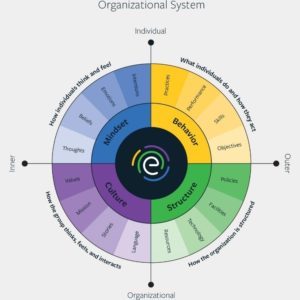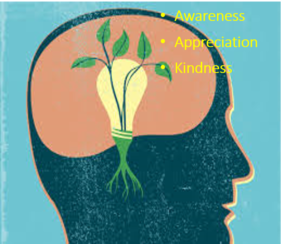Courageous Leadership from the Heart
Blog 4 of 6: Organisational Support for the whole person

A great TED talk by Benjamin Zander explained that the role of leadership is to make your employees’ eyes shine. I like that and think we can all understand what he is getting at. Happy, energised and engaged employees from the inside-out. Another view is that the leader’s role is to create the right environment, then get out of the way and let the employees get on with doing the job.
Yet organisations have a great tendency to concentrate on the task and not the process, relationships, mindsets, behaviours, culture and the how.
Organisations focus on the “outer” experience. Resources, technology, facilities, policies, planning, performance indicators and the expectations from employees – skills, objectives, and performance appraisals.
The “inner” experience of individual mindsets, relationships and process quality are under-appreciated, underdeveloped and yet fundamental to organisations of the future in this volatile, uncertain, complex and ambiguous (VUCA) world.
During my 40 years working life I have been completely unable to fully understand the predominant paradigm of fear-based leadership.
| Courageous Leadership | |
| Fear | Courage |
| Authoritarian | Emancipation |
| Leader-follower relation | Co-creative relation |
| Motivated by Power | Motivated by the Heart |
| Blame culture | Compassionate culture |
| Risk averse | Pioneering |
| Adversarial | Inspirational |
| Competitive | Empathic |
| Command and control | Improvisational |
| (Source: Giles Hutchins) | |
It may work to get results in the short run, but all you are getting is compliance from employees. Employees who are constantly afraid aren’t focused on doing better – they’re focused on not making a mistake. Their productivity and creativity are stifled. If they have ideas about how to improve a process, productivity, or service to the customer, they’re probably not going to speak up for fear of being criticised. Yesterday’s logic is a hierarchic, KPI-obsessed, siloed, control-based mind-set that reduces the ability of our organisations to adapt and evolve.
It’s as though we’ve sacrificed our human-ness for the sake of performing at work, and people and organisations are struggling as a result. Employee disengagement is high, and wellbeing is low. Families are breaking down, and incivility at work has been on the rise. Most people are surviving, and very few are thriving.
But we can foster an environment of trust, safety, recognition, growth, and connection.
Consciousness (and Wholeness) in the workplace, be it factory floor or office, is everyone’s responsibility, but the organisation needs to help make this happen by building a culture and instituting practices that help each person in being their best selves – creating a work environment where people can truly thrive, thereby gaining passion, commitment and loyalty in service of a purpose they believe in. If you take care of the people, they will take care of the organisation.
In Jersey, I know the Chief Probation Officer, who implemented a fundamental new way of working for the service. Meetings were held to explain and engage the team on the system, standards developed, and comprehensive training was provided along with monthly progress meetings for all staff. The Chief was sufficiently aware and humble to admit that after the training, the staff knew more about the service best practices and systems and to let them simply get on with it. They each had responsibility for completing their workload without micromanagement. They and the service blossomed. Through this the service became highly respected within the government of Jersey.
Courageous and conscious leadership is for all. Motivated by the heart, compassion, and empathy in co-creating the organisation’s culture. Everyone to stand up for what they believe in, to not tolerate injustice, to query, to question, to be reflective, to make the organisation work for everyone. In doing this from a state of inner peace and kindness you somehow find the right vocabulary and the right body language to not offend others and help to create the trust and respect you would like to see in the workplace. The key principle here is that the internal “being” state, largely drives the external and visible “doing”. If you get the “being” right, the “doing” generally takes care of itself.
The Energy Project believe “the most powerful way to ensure high performance is by recognising what’s going on inside of your people.
 Source: www.theenergyproject.com
Source: www.theenergyproject.com
When employees feel their best — physically, emotionally, mentally and spiritually (nurturing oneself and others) — they focus more deeply, think more creatively, lead more effectively, and make better decisions”. For this to happen, more prominence on individual mindsets and the inner workings of organisational culture is needed.
Organisational culture, or “the way we do things around here” affects the way people and groups interact with each other, with clients, and with stakeholders. Creating a culture that brings out the best in who your people are, their natural talents, strengths, and positive qualities is about supporting people in learning, growing, developing, evolving and becoming the best version of themselves.
A great example was the last organisation in which I was employed where we used appreciative inquiry, deep listening, ways of council, collaborative approaches, and multi-stakeholder dialogue in addition to teamwork perception questionnaires, encouraging the Circle of Better Life (physical activity, rest and renewal, nutrition, mental focus), energy guidance (physical, emotional, mental and spiritual energy) and collaborative conversations training to meld the team into a cohesive energised whole. All these approaches helped enliven our ways of relating with ourselves, with colleagues, and with the wider stakeholder system.
The organisation’s Indonesia project on the elimination of child labour received so much praise from the founders, national governments, local companies, employers’ associations, unions and farmers for the long-term approach of getting all the stakeholders together, relationship building, listening to all stakeholders and agreeing a common way forward. It was the inner quality of the project manager that made this all come about so well.
Many leaders believe they shouldn’t have any concern for what a person is doing outside of the office. In addition, it seems ingrained in business that we should “leave our home life at the door”. However, if someone is having challenges outside of the office, those challenges affect how they’ll show up at work. When you look at this in the cold light of day, how awful, unsympathetic and un-motivational this is. Empathy, care, emotional resilience and understanding is needed in the workplace and a commitment to people thriving in their whole lives.
Quality relationships boil down to trust, and we build trust by fostering connection. We connect with people by getting to know them through shared experiences and aims. Whether it’s a treasure hunt, team building activity, community service initiative, paint night, picnic, or after-work drinks, when we bring people together for the sole purpose of fostering connection and giving people the experience of belonging, everyone wins.
The key to high-quality teamwork and communication is trust, and it’s hard to trust somebody that you don’t know.

Authentically connecting, appreciating and being kind to colleagues is a key component for organisations to promote. This may seem obvious and basic good management to many readers but, as shown elsewhere in my blogs, evidence shows this is NOT most people’s experience of their workplace. The “way we do things around here” will need to be enhanced through coaching skills, conflict resolution, communication skills, systemic dialogue, deep listening, and continual feedback. It will be a long journey, but the current way organisations operate is simply not working. Trust, belief in, and support to your employees is the way forward.
The next piece of the puzzle is to embrace self-management: the next blog.
Intandem can assist with Organisational Support for the whole person:
We can help your organisation support the whole person to engage and be more energised through courage-based leadership recognising what’s going on in people’s heads. Increasing physical, emotional, mental and spiritual energy so that they focus more deeply, think more creatively, lead more effectively, and make better decisions.
Courageous and Conscious Leadership from the heart:
Intandem and our network of consultants can accompany you in finding clarity and quality of mind entailing individual Conscious Lives, organisational purpose and simplicity, support for the whole person, embracing self-management and collective leadership for action.
If you would like to discuss your organisations way forward contact chrisburton@intandem.ch
